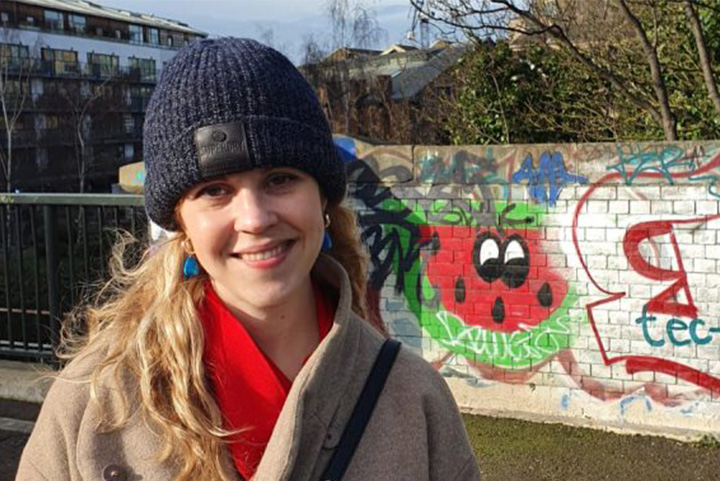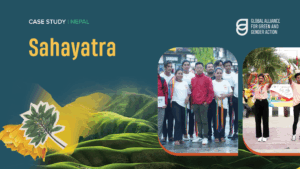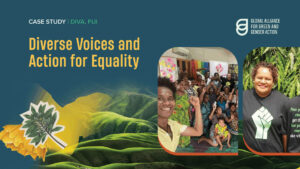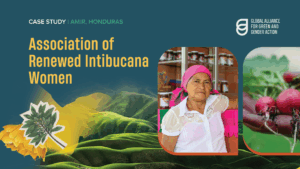A conversation with 350.org

350.org joins the GAGGA network as a strategic ally that is working to end the age of fossil fuels and build a world of community-led renewable energy for all. 350.org’s global campaigns director, Aggy Hall, spoke to us about how the organization’s Just Recovery work can support GAGGA’s new strategies and the importance of an intersectional approach.
What would you like the GAGGA network to know about your work and what your goals are?
350.org is an international climate organization dedicated to ending the era of fossil fuels. Beyond that, we also fight for climate justice more broadly, working with a range of partners all around the world to understand what climate justice can look like and how we can get there together. Our priority campaign area is on fossil finance — what we’re trying to do is cut off financial flows to the fossil fuel industry at the source, targeting banks and financial institutions all around the world. We want to see investment in a Just Transition that moves us off fossil fuel dependency and into a green, just future. You might know of 350’s divestment campaign, which is what we started out with as an organization — our campaigning has secured divestment commitments of $14.61 trillion of managed assets from 1,244 institutions.
What do you see as 350.org’s strengths?
We are “people power” focused. Our staff is located in 28 countries and we work closely with thousands of partners around the world, from the grassroots level to international collaborations and coalitions, working on time-limited projects and global mobilizations. As we have grown, our model has been to train volunteers on the ground as climate leaders, who in turn launch 350 affiliates, which run the gamut, from large, well-organized and funded independent nonprofits like Fossielvrij Netherlands to less-formal affiliates which may operate in cities, college campuses and countries.
It’s really important to us that we work together with people around the world, frontline communities, and our partners to create change. We’re not a policy-focused organization; rather,we concentrate our energies on bringing people together to organize, mobilize and take collective action for impact. That’s our main strength: we see that the power for change is within people, especially when they take action together.
It’s also crucial that when we campaign for justice, whether that’s gender justice or climate justice that we understand how issues intersect. Understanding how these pieces overlap can help us all organize together to take action for justice more broadly, rather than trying to separate out and focusing on only climate, or only gender. We’re stronger when we work together across the sector and across issue areas.
What does 350.org hope to bring to the GAGGA network and what can GAGGA bring to 350.org? What would you like to learn from GAGGA?
350.org’s global reach and engagement in so many partnerships and coalitions puts us in a great position to support GAGGA’s lobbying and advocacy efforts. Our principal campaign targets are currently International Financial Institutions, and one of 350.org’s main initiatives at the moment are networked Global Finance campaigns. This campaign model lends itself beautifully to GAGGA’s strategy.
I think our Just Recovery work offers a good opportunity for us to support GAGGA’s strategies of Strengthening, Linking, and Influencing. Just Recovery is the global framework through which we work as we have seen that governments can and will expend enormous resources when it is demanded. What we seek is that those resources go to the people and communities most impacted by climate and pandemic disaster, which is disproportionately women and girls in the Global South. We are also seizing upon this moment to dramatically transform the power dynamics of extractivism. We want to partner with GAGGA to unite the climate justice, youth, Indigenous leadership and gender justice movements and organizations to present an unstoppable force for transformative change.
GAGGA can bring so much value to 350.org’s work. We can learn from GAGGA in terms of applying a gender lens to environmental and climate issues, and working with women’s and girl’s groups around the world — we do some of this, but can do so much more. What does that mean for our campaigning, organizing, mobilizing, messaging? We are looking forward to finding out more.
What is a key success you are proud of?
We’ve had some good campaign developments in the last year in 350.org — ranging from key fossil fuel projects being cancelled, to financial institutions making statements about withdrawing financial support for fossil fuels. All of these of course make us proud. But I think for me personally, our shift over the last year towards a more intersectional approach to campaigning makes me happy — it speaks to a core part of my campaigner’s heart! As I said earlier, we cannot effectively campaign for justice without understanding people’s different identities, lived experiences, and needs in the world.
Could you tell me a bit about the Just Recovery Gatherings you’ve organized?
Yes! We held a Global Just Recovery Gathering in April. It was so much fun (and work of course, for the organizers!). Basically it was 72 hours of workshops, panel discussions, and musical or art sessions — 196 in total held in 11 languages! We were joined by 150 amazing partners, including GAGGA, some fantastic speakers, wonderful artists, and 700 participants from 151 countries all over the world. I had the privilege of chairing the opening panel and it was a real honor, one I’ll never forget. You can check out the website where you’ll find a link to videos of the panels, workshops, and cultural sessions. Hard to pick one to recommend… but I went to the GAGGA one and enjoyed it!
Any specific resources you’d like to share with the network? News, important dates?
Yes, our website of course to sign up for our emails! Our trainings website in case that’s useful, and the Just Recovery Gathering information as I’ve mentioned. You can also find and join local groups in specific countries and regions on 350.org’s website here.
Featured image above is courtesy of Aggy Hall.
Read more








